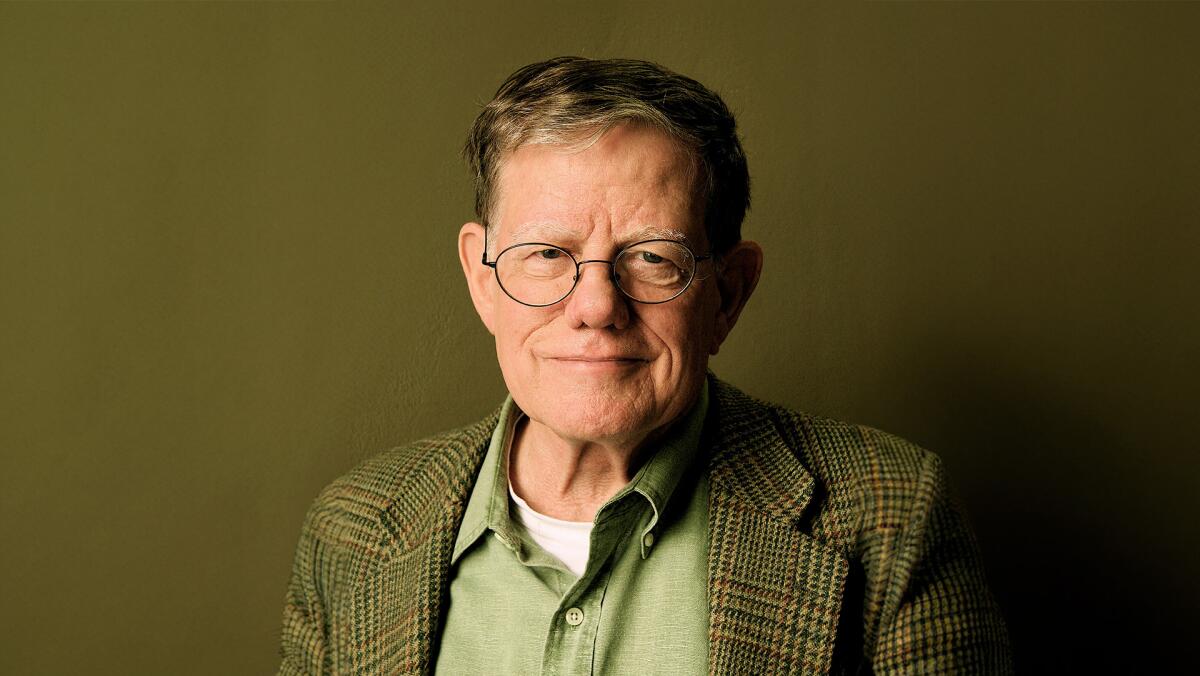Larry Pryor, former Times journalist and USC professor, dies at 86

- Share via
Larry Pryor, a former Los Angeles Times journalist who embraced the digital world before much of the industry and whose work as a reporter and editor covering the environment spurred action on climate issues, died on July 13 of complications from Parkinson’s disease. He was 86.
Pryor, who was also a novelist and sang choir throughout his life with his wife, Gabrielle, started his journalism career at the Louisville Courier Journal in Kentucky before relocating to Southern California in 1968 to work in The Times’ Orange County edition, according to his son, Ben Pryor.
“He was totally committed to journalism. He was totally committed to the values that journalism represents,” Ben Pryor said. “And was that way to the very end.”
He covered a mix of state and local politics and environmental issues, eventually joining The Times in its main downtown Los Angeles office. He was alert to the ways climate would shape California, filing stories about nuclear power and documenting the effects of drilling on the Southern California coast and the threat communities faced from environmental exploitation.
A series of stories he wrote in 1977 about the failure to appropriately assess the risk of constructing storage tanks for liquefied petroleum gas in a densely populated area caught the attention of Gov. Jerry Brown, who ordered a report that ultimately recommended a series of safety and regulatory steps, according to Ben Pryor.
When Brown sought the presidency two years later, Pryor left The Times to serve as Brown’s press secretary until the former governor fell out of contention for the Democratic nomination.
Pryor worked as a research consultant and novelist, publishing “The Viper,” a spy tale involving financiers from Saudi Arabia and Formula One racing, before returning to The Times in the 1980s. In his second stint at the paper, he worked as an editor and copy editor and was a member of The Times’ team that won a 1993 Pulitzer Prize for coverage of the Los Angeles riots.
Colleagues remembered Pryor as a collaborative person who helped shape the early days of environment coverage. Bob Rawitch, who worked at The Times from 1968 to ’95 and was the executive editor of the Valley and Ventura editions, worked with Pryor on an award-winning story about the California Public Utilities Commission and then-Gov. Ronald Reagan’s influence over it.
“He was a dream to work with,” Rawitch said. “There was never a cross word, never an objection. I would write a portion and he would write a portion, then we’d both go through it together and polish what the other wrote.”
At The Times, Pryor was an early proponent of adapting to changing technology, encouraging reporters to use tools such as geomapping, or using data to create maps, said Jeff Perlman, who worked for The Times for more than three decades.
“He was absolutely convinced that digital journalism was the future,” Perlman said, adding that Pryor wanted to refer to the stories that appeared on The Times’ website as the “database,” which never quite caught on.
Pryor was also one of the paper’s first journalists to produce work through an early form of digital journalism called teletext, said Joe Saltzman, a longtime friend and a USC journalism professor.
But Saltzman said The Times didn’t see Pryor’s vision at the time and declined to invest more money in the technological effort.
“He was creating something nobody understood, which was the beginnings of the internet and digital journalism,” Saltzman said. “He was way ahead.”
Saltzman and Pryor met as students at the Columbia Graduate School of Journalism, where they graduated in 1962. Pryor stood in contrast to other students in the program, who could be vicious and competitive.
“Larry was nothing like that,” Saltzman said. “He was a sweet, gentle, kind, hardworking, very serious journalism student. But just a nice guy.”
Pryor left The Times in 1999 for a full-time appointment teaching journalism at USC, where he had taught part time since 1985 as an adjunct faculty member in the Annenberg School for Communication and Journalism.
At USC, he won a grant to start the Online Journalism Review, which offered reporting and commentary on changes to media. He also taught the school’s first online journalism classes and designed curriculum to keep up with technological advances, said Gordon Stables, director of journalism at Annenberg.
“He was one of those innovative faculty who started doing this work early,” Stables said. “This was really challenging work.”
Pryor retired from USC in 2016 to care for his wife, who has Alzheimer’s disease.
To his sons, Pryor was a font of knowledge, sharing with them his love for Formula One racing and exposing them at an early age to philosophical works and novels.
“His whole thing, if nothing else, is just a constant interest in things, whether it’s the ecology of his backyard or political philosophy or the machinations of the politicians in Orange County and L.A.,” Ben Pryor said. “He just was fascinated by stuff.”
Growing up, Ben Pryor said, he learned not to share his essays with his dad the night before they were due in class — the assignments always returned after a 10-minute editing session marked with red pencil his dad brought home from the newsroom.
In his final weeks, Pryor passed along reminders to his sons about the importance of voting, much like he did during their childhood.
“He was always, always optimistic about the future of the country and the future of his communities,” Ben Pryor said.
Along with Ben, Pryor is survived by his wife, Gabrielle, and another son, William.
More to Read
Sign up for Essential California
The most important California stories and recommendations in your inbox every morning.
You may occasionally receive promotional content from the Los Angeles Times.












